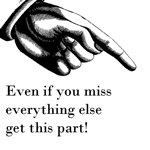Hunger is simple enough, right? Hunger is your body saying, “I want food.” When we’re hungry we need food; when we aren’t hungry we don’t need food. It’s that simple. . . or . . . wouldn’t it be nice if it were that simple?
In reality, a number of things masquerade as hunger. Being able to tell them from the real thing is is crucial if we’re going to be able to maintain weight and health.
 One of the things that masquerades as hunger is a wonky blood sugar. If you eat something sweet, especially something with a high glycemic index, your blood sugar rises quickly. Your pancreas looks up and says, “Wow, dump a bunch of insulin. We have sugar to process.” If everything is running at peak efficiency, your pancreas guesses right and drops the perfect amount of insulin to process the sugar. Your cells pick up the insulin and use it to process the sugar, and everyone lives happily ever after. If, however, you’ve eaten a typical Western diet with lots of sugar over the course your life, your cells are a bit shell-shocked. The pancreas releases insulin and the cells just sit there. So the pancreas releases more. Before you know it, you have too much insulin in your bloodstream. This insulin finishes processing the sugar you ate and then settles in to work on the sugar you normally keep in your blood to run things like your brain. You now have low blood sugar. You haven’t burned the calories in the original sugar hit yet, but your blood stream thinks it’s out of fuel.
One of the things that masquerades as hunger is a wonky blood sugar. If you eat something sweet, especially something with a high glycemic index, your blood sugar rises quickly. Your pancreas looks up and says, “Wow, dump a bunch of insulin. We have sugar to process.” If everything is running at peak efficiency, your pancreas guesses right and drops the perfect amount of insulin to process the sugar. Your cells pick up the insulin and use it to process the sugar, and everyone lives happily ever after. If, however, you’ve eaten a typical Western diet with lots of sugar over the course your life, your cells are a bit shell-shocked. The pancreas releases insulin and the cells just sit there. So the pancreas releases more. Before you know it, you have too much insulin in your bloodstream. This insulin finishes processing the sugar you ate and then settles in to work on the sugar you normally keep in your blood to run things like your brain. You now have low blood sugar. You haven’t burned the calories in the original sugar hit yet, but your blood stream thinks it’s out of fuel.
What does that have to do with hunger? Low blood sugar feels a lot like hunger. If your blood sugar is low, you’ll want food. If your blood sugar drops before you finish burning the calories in the last meal (or snack) you ate, your body will tuck the excess calories away for later (in other words, will turn them to fat) and will ask for more food.
How do you keep your blood sugar stable? The biggest thing is to eat low on the glycemic index. Lay off the processed sugar, go easy on all processed carbs. Limit the sugar you take in even if it is “good sugar” like fruit juice. Eat carbs with a little bit (Hey, I said a little bit!) of good quality minimally processed oil and a little bit of protein. If you’re like most people, the sugar cravings will be fierce for about a week. If you stay off processed sugar and carbs completely, they should die back within a week or two. If the sugar jonesing is driving you crazy, find a good traditional Chinese medicine practitioner (the real thing, not just a chiropractor with needles or a community acupuncture needle jockey). They will be able to help a lot.
Blood sugar is only one thing that can masquerade as hunger. Another is simply habit. You get home from work or school, and what to you do? You sit down with your TV in the evening, and what do you do? Can you do income taxes without M&Ms or Budweiser? Is there a soda or a bag of chips sitting next you at the computer as you read this? Habits and rituals feel a lot like hunger sometimes.
 Want a challenge? Pick your worst food habit–eating in the car, in front of the TV, at the computer, whatever–and see if you can go a week without doing it. Think of it as liberation. If someone knocked on your door every evening at 8:30 and forced you to eat, you’d probably be pretty ticked off. The habit is doing the same thing. By breaking it, you are breaking some of your self-built chains. Perhaps more importantly, you are training yourself to recognize when you are hungry and when you just usually eat food.
Want a challenge? Pick your worst food habit–eating in the car, in front of the TV, at the computer, whatever–and see if you can go a week without doing it. Think of it as liberation. If someone knocked on your door every evening at 8:30 and forced you to eat, you’d probably be pretty ticked off. The habit is doing the same thing. By breaking it, you are breaking some of your self-built chains. Perhaps more importantly, you are training yourself to recognize when you are hungry and when you just usually eat food.
Boredom also feels like hunger. So does sadness, ennui, existential angst. It makes sense. Eat the right food (or the wrong food, depending on how you look at it), and you have an instant party in you brain. Entertainment food keeps your brain distracted. You don’t have to look at your life or address what’s bumming you out when you are under the influence of cheesecake, or onion rings, or pizza. Do you know the two-year-old in your brain, the one who, every time you try to meditate, pray, study, or get some work done, pokes its head up and says, “I’m bored. This is stupid. I want to do something fun.” That two-year-old can feel just like hunger. And by the way, so can the six-month-old in your brain who just wants to put everything in his mouth for the sake of putting everything in his mouth.
And finally, what goes on in your brain during Red Lobster and Cadbury commercials also masquerades as hunger. Go ahead and tell me you aren’t affected by commercials. We’ll go find an fMRI and run you through and take a look at everything that lights up when you watch a commercial. If you’re watching a commercial for a major national food company, you can bet they’ve run folks through tests and scans to make sure the commercial works. Do you think Coke would pay “American Idol” who-know-how-many-millions to place Coke glasses and commercials strategically through the show if they weren’t sure they were working? You can bet they’ve tested those placements, and that they’re working on you on some level. Next time you get a craving  while watching TV, ask yourself, “Why am I hungry for that? Why now?” Watch carefully, and you might be able to see the manipulation at work.
while watching TV, ask yourself, “Why am I hungry for that? Why now?” Watch carefully, and you might be able to see the manipulation at work.
How do you tell if it’s real hunger? Where does the feeling originate? Is it above your neck? It’s not hunger. Is it below your neck–in your stomach, or in a shakiness in your muscles? That’s probably hunger. (Though if you ate that Three Musketeers bar in your desk about forty-five minutes ago, you could very well have a blood sugar thing going on. Remember this feeling next time you’re succumbing to the marketing onslaught in the grocery store checkout line. If you buy that Klondike Bar, its your own stupid fault if you can’t tell if it’s hunger an hour after you eat it. . . . But I digress.) Pseudo-hunger is usually a mouth thing, a brain thing. It has triggers, but it doesn’t have an organic cause.
Hunger is a gift. Pseudo-hunger is a master cracking its whip, making you dance. Hunger keeps you healthy. Pseudo-hunger can make you fat and sick. Learning to tell the difference is a step toward healthy eating.
